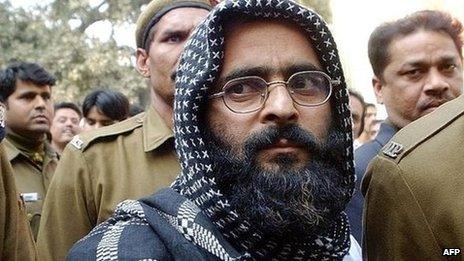Afzal Guru: Kashmir anger over hanging
- Published

Afzal Guru's appeal for clemency was rejected
There is anger in Indian-administered Kashmir over the unexpected hanging in secret of a Kashmiri militant, sentenced to death for the 2001 attack on India's parliament.
The chief minister of Jammu and Kashmir, Omar Abdullah, said Afzal Guru's execution "may fuel a feeling of alienation among the Kashmiri youth".
Two youths have died during protests in Kashmir against the hanging.
Guru was hanged on Saturday after his final clemency plea was rejected.
He had been on death row since 2002 and was executed at Tihar jail in Delhi.
Guru had always denied plotting the attack, which left 14 dead, including five militants.
Security has been stepped up across India and an indefinite curfew is in place in Indian-administered Kashmir, where news of the execution sparked protests.
Until recently, executions were rarely carried out in India.
But Guru's hanging was the second in the last three months - Mohammed Ajmal Qasab, the sole surviving attacker from the 2008 Mumbai attacks, was executed in November in a prison in the western city of Pune.
'Selective execution'
In an interview to news channel CNN-IBN, India would have to prove to the world that Guru's hanging was not "a selective execution".
"I had a premonition that Afzal Guru's execution would follow Ajmal Qasab's execution. I had a sense that Afzal Guru would be executed sooner rather than later. Generations of Kashmiris will identify with Afzal Guru.
"You will have to prove to the world that the death penalty is not used selectively. The onus rests on the judiciary and the political leadership to show that this wasn't a selective execution," he said.
Mr Abdullah said he had concerns that the Indian government did not follow correct procedure in carrying out the execution.
He said it was a "tragedy" that Guru was not allowed to meet his family before he was hanged and not allowed a "final farewell".
"If we are going to inform someone by post that his family member is going to be hanged, there is something seriously wrong with the system," he said.
The authorities, however, have denied not following the rules. "This is only about the law taking its course," Home Secretary RK Singh said.
Pakistan-backed attack?
Meanwhile, hundreds of police and paramilitary personnel have been deployed in towns and cities across Indian-administered Kashmir to try to contain unrest sparked by the execution.
A strict curfew remained in place for a third day on Monday in the Muslim-majority valley.
Cable television, mobile and Internet services have remained shut in most parts of the region.
Claimed in its entirety by both India and Pakistan, Kashmir has been a flashpoint for more than 60 years and two wars have been fought over it.
The December 2001 attack was one of the most controversial incidents in recent Indian history, correspondents say.
The 2001 attack left 14 people, including five militants, dead
Five rebels stormed India's parliament in Delhi on 13 December 2001, killing a gardener and eight policemen before they were shot dead by security forces.
India blamed the attack on the Jaish-e-Mohammed militant group, which it said was backed by Pakistan.
Pakistan denied involvement in the attack but relations between the two countries nosedived as their armies massed about a million troops along the border.
Afzal Guru, a former fruit merchant, was one of two men sentenced to death for helping to plan the attack, although the sentence of Shaukat Hussain was later reduced on appeal to 10 years in jail.
Guru was found guilty of arranging weapons for the attackers and of membership of Jaish-e-Mohammed, both of which he denied.
Two other people accused in the case, SAR Geelani and Afsan Guru, were acquitted due to a lack of evidence.
Afzal Guru's appeal was first refused by the Supreme Court and then the president.
- Published1 August 2012
- Published8 August 2019
- Published29 September 2011